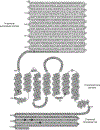Common calcium-sensing receptor (CASR) gene variants do not modify risk for chronic pancreatitis in a Hungarian cohort
- PMID: 34481716
- PMCID: PMC8663126
- DOI: 10.1016/j.pan.2021.08.012
Common calcium-sensing receptor (CASR) gene variants do not modify risk for chronic pancreatitis in a Hungarian cohort
Abstract
The calcium-sensing receptor (CASR) is expressed in the pancreas where it might regulate calcium concentrations in pancreatic secretions. Two independent studies reported conflicting results claiming that commonly occurring missense variants of the CASR gene are risk factors for chronic pancreatitis (CP). Here, we attempted to replicate the association between CASR variants and CP. We analyzed 337 patients and 840 controls from the Hungarian National Pancreas Registry either by direct sequencing of exon 7 and the flanking noncoding regions or by TaqMan SNP genotyping assays. We identified two common missense variants, c.2956G>T (p.A986S), and c.2968A>G (p.R990G), three low-frequency variants, c.3031C>G (p.Q1011E), c.2610G>A (p.E870=) and c.∗60T>A, and 8 rare variants including the novel variant c.1895G>A (p.G632D). When allelic or genotype distributions were considered, none of the CASR variants associated with CP. Subgroup analysis of nonalcoholic versus alcoholic patients revealed no disease association either. Our results demonstrate that common CASR variants do not modify the risk for CP and should not be considered as genetic risk factors in the clinical setting.
Keywords: Calcium-sensing receptor; Genetic association study; Pancreatitis; Variants.
Copyright © 2021 The Authors. Published by Elsevier B.V. All rights reserved.
Conflict of interest statement
Declaration of competing interest The authors have declared that no conflict of interest exists.
Figures

References
-
- Beyer G, Habtezion A, Werner J, Lerch MM, Mayerle J. Chronic pancreatitis. Lancet 2020, 396:499–512 - PubMed
MeSH terms
Substances
Grants and funding
LinkOut - more resources
Full Text Sources
Miscellaneous

